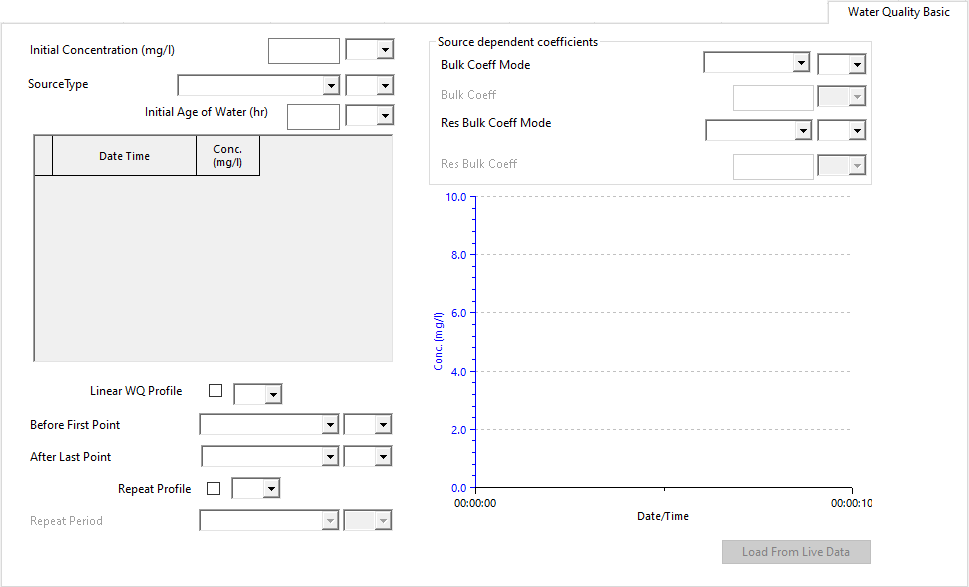This page allows you to view and edit a basic water quality profile and bulk coefficient values for nodes at which water can enter the system.
The page is displayed by clicking the Water Quality Basic tab on the property sheet for a fixed head that has control data added.

There are two ways to set up the input pollutant concentration level for a node:
- Use the Initial Concentration field to set an input concentration that is applied at the start of the simulation.
- Use the grid to enter a series of variable pollutant concentration / mass inflows at the node for the simulation.
By default no interpolation is used between data points. Each concentration value entered in the grid is maintained until the next date / time entry, or until the end of the simulation. Check the Linear WQ Profile box for linear interpolation to be used between data points.
Options for extending the profile outside of the entered dates / times
The page has options for extending the profile outside of the entered dates and times.
| Option | Description | ||||||
|---|---|---|---|---|---|---|---|
|
Before First Point |
|
||||||
|
After Last Point |
|
||||||
|
Repeat Profile Checkbox |
If checked, repeats a profile (from 00:00 for the selected Repeat Period) for the duration of the simulation. Important: When using the Repeat Profile option, if the defined profile spans over the selected repeat period, the profile will not be repeated.
|
||||||
|
Repeat Period |
Profile period which will be repeated throughout simulation, if the Repeat Profile box is checked. |
Options for water quality source type
The source type determines the method by which the profile defined in the water quality grid is applied to the network during a water quality simulation.
| Source Type | Description |
|---|---|
|
Fixed Concentration |
Concentration at a node is set to the profile defined in the water quality grid. For reservoir nodes, concentration profile is applied to water entering the reservoir. Mixing may occur at the reservoir node. See Water quality mixing controls for further details. Tip: Use a concentration value of < 0 in the profile to switch off the concentration source and allow inflow from upstream pipes to set concentration at the node.
|
|
Additional Concentration |
Concentration profile defined in the water quality grid is applied to water leaving the node in addition to the calculated concentration. |
|
Concentration Booster |
Concentration in water leaving the node is set to the profile defined in the water quality grid (provided that the concentration calculated during the simulation is less than the defined concentration). |
|
Additional Mass Flow |
Mass flow profile defined in the water quality grid is applied to water leaving the node in addition to the calculated concentration. |
Options for source dependent coefficients
The source dependent coefficient data fields are used to specify bulk coefficient parameters to be applied to water entering the system at the node during a water quality simulation.
| Data Field | Description | ||||||
|---|---|---|---|---|---|---|---|
| Bulk Coeff Mode |
Method by which Bulk Coefficient is applied to water entering the system at the node:
|
||||||
| Bulk Coeff |
Reaction rate parameter used to calculate the change in concentration of a substance as it reacts with material in the bulk flow. The value specified here is applied to water entering the system at the node. The bulk coefficient has a positive value if the concentration of the substance grows over time, and a negative value if the concentration decays over time. |
||||||
| Res Bulk Coeff Mode |
Method by which Res Bulk Coefficient is applied to water entering the system at the node:
|
||||||
| Res Bulk Coeff |
Reaction rate parameter used to calculate the change in concentration of a substance as it reacts with material in a reservoir. The value specified here is applied to water entering the system at the node. The bulk coefficient has a positive value if the concentration of the substance grows over time, and a negative value if the concentration decays over time. |
Option to use live data
You can load live data by clicking the Load From Live Data button and using the Link To Live Data dialog to choose your source and update the water quality grid.
When you have finished updating, close the dialog using the X button in the top right corner.
Option to clear the water quality profile grid
A quick method of clearing the grid is to use the Clear button on the Link To Live Data dialog.
